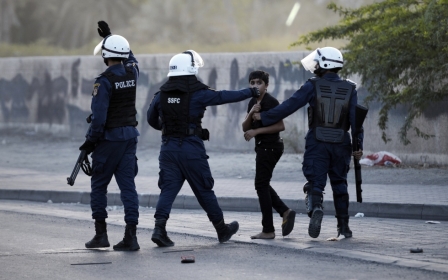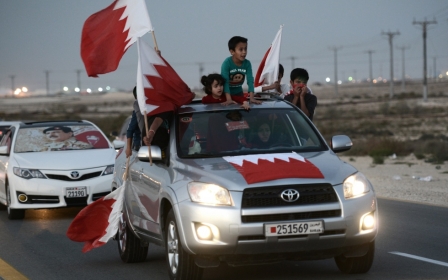Rage in Bahrain at detention of opposition leader

Police in Bahrain clashed with protesters on Thursday for the fifth day in a row, as international calls grow for the release of a prominent opposition leader.
Police used tear gas and batons against protesters when clashes erupted after prayers at the Mumen mosque in the capital Manama, a departure from previous unrest that has focused on the suburban Shiite villages.
Protesters rallied against the continued detention of al-Wefaq opposition leader Sheikh Ali Salman, who was arrested on 27 December and is being held on suspicion of “inciting violence to achieve political change.”
Human rights groups reported injuries and arrests at Thursday’s protests.
"Dozens of people... including women and children, were arrested," said a statement from the Bahrain Observatory for Human Rights.
Protesters burned the British flag, said to be a response to the UK’s recent announcement that they will build a new military base in Bahrain.
The UK is a close ally of Bahrain’s Sunni al-Khalifa rulers and activists told MEE that protesters are becoming increasingly angry at London’s support for the monarchy.
“Increasing criticism and protests against the British – including burning the flag – reflect growing anger against the UK government and its ambassador in Bahrain for their continuous support to the repressive ruling regime,” said Nabeel Rajab, founder of the Bahrain Centre for Human Rights.
“The UK has stood against the aspirations of the Bahraini people, who are struggling for democracy, equality and social justice. It is unclear if these protests will go on to harm any British strategic interests here but it is certain the anger is mounting and it may swiftly move to other countries in the region.”
International condemnation
While the UK has remained silent on the arrest of Sheikh Salman, international calls have grown calling for the 49-year-old to be released, including from the US who have their Fifth Fleet based on the island.
“Opposition parties that peacefully voice criticism of the government play a vital role in inclusive, pluralistic states and societies,” a US State Department statement read on Wednesday. “We are concerned that this action against a senior leader of the opposition will only inflame tensions.”
“We strongly urge the Government of Bahrain to follow due process in this and all cases and abide by its commitment to transparent judicial proceedings conducted in full accordance with Bahraini law and Bahrain’s international legal obligations.”
The EU said the arrest of Sheikh Salman “carries the risk of jeopardising an already difficult political and security situation” and the UN Human Rights Commission called for his “immediate release”.
The Bahraini government responded to criticism from the UN by describing it as “strange”.
“We are surprised that the interrogation of opposition figures against the background of several infringements of the law has been used as a human rights issue,” the Bahraini Foreign Ministry said in a statement on Thursday.
The ministry stressed that the case against Sheikh Salman is a “legal one”.
Protests inspired by the Arab Spring erupted in Bahrain during February 2011 and have continued ever since. Rallies began with calls for a wholly elected government but later included demands for the monarchy to be completely overthrown.
Bahrain’s rulers have consistently said their powerful neighbour Iran is behind the protest movement, who they allege have provided arms to the opposition. No evidence has been provided to back up these claims.
Tehran has also voiced its concern at the arrest of the Wefaq’s Sheikh Salman and said they are “extremely worried about his situation.”
“We want him to be released,” said Marzieh Afkham, spokesperson for Iran’s foreign ministry, told reporters on Wednesday. “We believe that the security measures Bahrain’s government has adopted to solve its internal issues are wrong.”
Bahrain responded to the criticism by telling Iran to look at its own human rights record.
“The ministry condemns the statement […] regarding investigations with a Bahraini citizen involved in a number of illegal actions and violations,” the foreign ministry said in a statement.
“It also expresses surprise and regret over Iran’s adoption of such hostile policies that steer it away from the concept of good neighbourliness with the countries of the region, urging it to look after the interests of the brotherly Muslim Iranians who suffer from flagrant violations of human rights and freedom of expression.”
Bahrain’s prosecutor in charge of the Sheikh Salman case said the opposition leader was interrogated again on Thursday and confronted with recordings he had made.
It said his lawyers had been present, and that Salman had also been allowed a visit by relatives.
In one recording, Salman tells of how, while abroad, someone proposed to him "militarising" the opposition movement, a proposal he rejected.
The prosecution did not explain why it highlighted this incident, which could undermine its assertion that he was seeking a violent overthrow of the regime.
Stay informed with MEE's newsletters
Sign up to get the latest alerts, insights and analysis, starting with Turkey Unpacked
Middle East Eye delivers independent and unrivalled coverage and analysis of the Middle East, North Africa and beyond. To learn more about republishing this content and the associated fees, please fill out this form. More about MEE can be found here.




